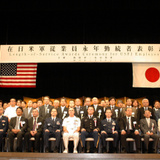Tailor treatment of PTSD to patient, experts urge
Treatment for post-traumatic stress disorder — suffered by thousands of U.S. military members returning from combat zones — must be tailored to the individual, experts said Tuesday at a heath-care conference in El Paso.
And making an initial therapeutic contact with people struggling to readjust to "normal" life, they said, requires giving them a chance to talk about it.
"Don't label," said psychologist Vicki Thomas, who works at the Beaumont Army Medical Center's Warrior Resilience Center. "You want to show you care and ask questions. PTSD can (push people to be so) isolated that you lose that ability to just share and talk."
Thomas was responding to a question from a nursing student, who was among about 70 people, including nurses, community outreach specialists and other health-care workers, at the conference. They were attending a session at the Mano y Corazón, Binational Conference of Multicultural Health Care Solutions co-sponsored by state Sen. José Rodríguez, D-El Paso, and the El Paso Chapter of the National Association of Hispanic Nurses.
Symptoms of a stress disorder include irritability, sleep deprivation, hypervigilance, relationship problems and fear of public places, the experts said.
Daytime flashbacks and nightmares force people with PTSD to relive horrific incidents in stark detail, said clinical psychologist Yolanda Guerrero Kraynick, who works at Beaumont's Biggs Behavioral Health Clinic.
Sights, smells and even touch can trigger episodes of panic and hyperarousal, she said.
When a person's nervous system is on high alert for months at a time — looking for any sign of ambush or other life-threatening danger — it can cause changes in the brain. The "fight-or-flight" mechanism takes over from the part of the brain that critically analyzes a threat to determine whether a reaction is necessary, Guerrero Kraynick said.
Even after returning to the relative safety of the United States, everyday situations can appear life threatening to people suffering from a combat-related stress disorder. Driving under a bridge or being hemmed in by traffic at a stop light reminds them of situations that exposed them to enemy attack; a cardboard box or a pile of rocks on the side of the road can disguise a roadside bomb.
Something instantly dismissed by people without combat experience can trigger anxiety and adrenaline for someone suffering from a traumatic-stress disorder.
In public places they keep their backs to a wall so they can see what is going on and map a quick exit route.
Walmart is a frightening experience, with its unpredictable flow of humanity. Indeed, Walmart has come to symbolize a type of treatment in which the person is asked to endure the intense anxiety created by that exposure until it subsides. Through repetition, the symptoms sometimes subside.
Treatments can depend on the severity of those symptoms, Guerrero Kraynick said.
Methods include desensitization and prolonged exposure. In some cases, people who suffer the illness are asked to recount horrific experiences in detail.
"It involves telling your story on tape for an hour over and over and over again," Thomas said. It is not for everyone, she said, and has "lots of treatment dropouts."
If soldiers do not respond to the usual treatments, "The question is what adjunct therapies can you use?" Thomas said. "It's easy to write them off as a 'failure to comply with treatment.' "
Resilience center therapists use additional approaches such as acupuncture, medical massage, tai chi and biofeedback, she said.
"It is not a one-size-fits-all treatment," Thomas said.
And not only can life improve for people suffering from traumatic stress disorders, she said, but in some cases those individuals come to know themselves better than people who have not suffered through such ordeals.
"People sometimes tell me, 'How can I feel so awful and you're telling me I can grow from it?' " Thomas said. "But the process of overcoming it can make you stronger."
Overcoming also involves coping with the social stigma of a wound with no obvious physical signs. Unit commanders have, in some cases, assumed soldiers suffering from stress disorders were trying to avoid work or end a commitment to the Army.
And soldiers who want to remain in the military are concerned such a diagnosis will end their careers. Thomas said all that is changing, and the resilience center has even given soldiers who respond to treatment a chance, if they request it, to return to combat zones, which is part of an infantryman's job.
"The diagnosis alone shouldn't be the criteria," Thomas said. "We are looking very hard at the performance rather than the diagnosis."










